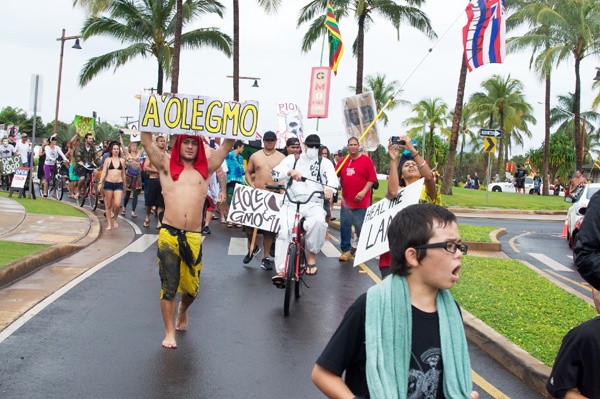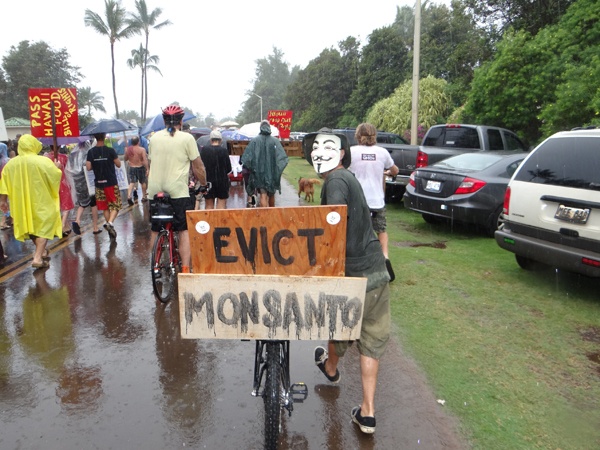PO‘IPU — It was sprinkling between periods of downpour, but several hundred demonstrators marched from the Grand Hyatt Kaua‘i Resort and Spa to Mano‘okalanipo Park on Saturday.
“We’re marching anyway, no matter what,” said Dustin Barca, one of the lead organizers of the protest and a founding member of ‘Ohana O Kaua‘i.
The march against genetically modified organisms (GMOs) caused momentary traffic delays along Po‘ipu Road, as protesters armed themselves with signs that read “GMO must go,” “Feed Kaua‘i, don’t bleed Kaua‘i,” “You are what U eat” and “Evict Monsanto.”
The marchers described themselves as safe food activists in a movement to encourage the state Legislature to pass a food labeling bill that has stalled in the Senate.
The protesters were comprised of island residents, local farmers and members of the organizations ‘Ohana O Kaua‘i, GMO Justice Coalition, GMO-Free Kaua‘i and Hawai‘i SEED.
This was the second of five weekly island marches that began March 2 at Hale‘iwa in O‘ahu. The marches continue on Big Island Saturday, followed by Maui on March 23 and Moloka’i on March 30.
The goal is to convince state senators to hold open hearings on the labeling issue. Organizers said one influential politician is Sen. Ronald Kouchi, who represents Kaua‘i and Ni‘ihau, and serves as Vice Chairman of the Agriculture Committee, as well as Vice President of the Senate.
“I am here because Sen. Kouchi is the one who can allow us to keep the path going for the labeling bill,” said Walter Ritte, a founding member of Label it Hawai‘i. “He is a key player in all of this, and if he doesn’t help to open the doors to a fair hearing, then the bill will get killed in the Senate.”
House Bill 174 imposes labeling requirements and restrictions on GMO foods.
Ritte said the House companion bill would likely have died last session after three committee referrals. He credited the public marches with influencing a key Finance Committee hearing, and then the open floor vote that followed.
Growing concerns
Ritte is from Molaka‘i and his spouse Loretta is originally from Kalaheo. Loretta said she does not recall cornfields when she was growing up and said her former classmates talk about their children getting sick from the spraying of pesticides.
“I think it is downright insensitive of politicians, chemical companies and corporations to not even take into consideration what they are doing and the effects on us,” Loretta said. “That is why I am here. It makes me really upset and angry.”
Jeri DiPietro of GMO-Free Kaua‘i said she volunteers as a way to help voice the concern of people in Waimea, who she said continue to suffer the effects of pesticide spraying on experimental herbicide resistant crops. Now the fields have expanded from Polihale to Po‘ipu and Lihu‘e, she said.
“It is good to be down here in Po‘ipu, which is the economic engine of the island,” DiPietro said. “We think that it is in the best interest of the (Hawai‘i) Tourism Authority and all of the county agencies on the island to reform the use of pesticides to protect the visitor industry and our ability to grow food.”
Fern Rosenstiel was born and raised on Kaua‘i and returned after a decade of studying marine biology, wildlife management, environmental chemistry and environmental science in Australia.
As a co-founder of ‘Ohana O Kaua‘i, she said the two-month-old organization is a way for local people to unite on issues of mutual interest such as sustainability, which is a Hawaiian cultural value.
Rosenstiel said she is concerned about ceded land issues and small farmers rights. She is also concerned that companies are using murky regulations and patent laws to refuse requests for data on the amount, frequency and products of spraying.
“That is the problem. Who is testing the land?” Rosenstiel said. “The laws don’t protect the people, they protect the corporations to be able to use these toxic chemicals on our land.”
Citizens connect
Rosenstiel said ‘Ohana O Kaua‘i is a way for local people with the same concerns to have a connection and a unified voice that can lobby government. Without that, the community engagement process is lost, she said, and government will just keep telling people what they are going to do with their land and water, and in some cases won’t even do that with a claim of confidentiality.
“The people are not being heard and there has definitely been a gap between the people that run this country, the bureaucrats and corporations that don’t have the peoples interest at heart,” she added.
Samuel Shaw of Kulture Tattoo in Hanapepe painted several of the signs that were carried in the march.
He was raised by a veteran of the War in Southeast Asia and learned about the chemical bombardment on soldiers and civilians alike at a young age.
He said this background made him aware early on about the use of DDT in the sugar cane era, and then when the chemical companies began to appear en masse on Kaua‘i more than a decade ago.
Shaw became active as his concern about the presence of chemicals in the water, soil and food grew.
“It makes me proud that people are paying attention about what is going into our environment and into our bodies, and now we are conscious of it,” Shaw said.
Catherine Ham Young Pfefer of Wainiha, a past member of several island organizations from the Burial Council to the effort to prevent development of the Hanalei Ridge, was present for the march to support the fight against GMO.
After learning about the presence of GMOs through a University of Hawai‘i study on Chinese taro, Ham Young said she became involved to ensure they were not allowed to experiment with Hawaiian taro.
She said the youth of Hawai‘i have taken the lead in protecting the land for future generations.
She participated in the march to help ensure the legislature takes a look at the amount of land and resources that are now controlled by GMOs.
“I am really concerned about it, and as the oldest one in this group, I am so thankful that these young people are all working together to let the whole world know to go against the GMOs,” she said.
Ritte said that Kaua‘i has the most to lose and should be taking the lead on this issue.
He said Hawai‘i is losing its long standing respect for farming because the chemical companies are now the major farmers.
“It is no secret that if you can’t grow your own food, you are putting yourself in jeopardy in Hawai‘i. … The entire state is saying that they want labeling and we have a Senate that has so far said they won’t even have hearings.”






